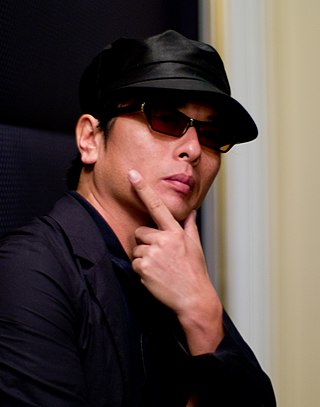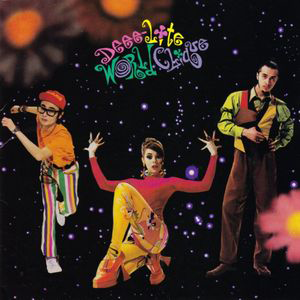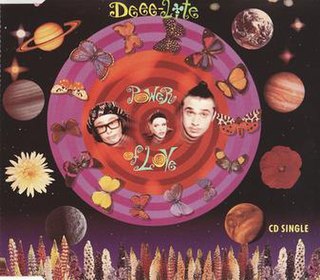
Out of Time is the seventh studio album by American alternative rock band R.E.M., released on March 12, 1991, by Warner Bros. Records. With Out of Time, R.E.M.'s status grew from that of a cult band to a massive international act. The record topped the album sales charts in both the United States and the United Kingdom, spending 109 weeks on U.S. album charts and, with two separate spells at the top, and spending 183 weeks on the British charts, including one week at the top. The album has sold more than four and a half million copies in the United States and more than 18 million copies worldwide. Out of Time won three Grammy Awards in 1992: one as Best Alternative Music Album, and two for its first single, "Losing My Religion".
Deee-Lite was an American house and dance music group formed in New York City. The group's single "Groove Is in the Heart," which was released in 1990 from their debut studio album, World Clique (1990), was a top-ten hit in multiple countries. In December 2016, Billboard ranked them as the 55th most successful dance artists of all time.

A longbox is a form of exterior paperboard packaging for musical compact discs in widespread use in the 1980s and early 1990s in North America.

Towa Tei is a Japanese artist, record producer, and DJ. Born in Yokohama, Japan, Towa was a member of Deee-Lite, from the US label Elektra Records in 1990 and shot to fame via their international hit single, "Groove Is In the Heart". He made his solo debut with the album Future Listening! in 1994. He has since relocated from New York to rural Nagano Prefecture in Japan.

World Clique is the debut album by American dance music band Deee-Lite, which was released in 1990. The album's first single, "Groove Is in the Heart", was a top-five success on both the U.S. Billboard Hot 100 and UK Singles Chart as well as a No. 1 hit on the U.S. Hot Dance Club Play chart. Three subsequent singles also hit the top ten on the U.S. dance chart, including "Power of Love/Build That Bridge", which also hit No. 1, and "Good Beat".
Club House were an Italian Italo house band formed in Italy in 1983. The group consisted of Carl Fanini, Gianfranco Bortolotti, Hidalgo Serra, and Silvio Pozzoli.

"Groove Is in the Heart" is a song by American dance band Deee-Lite, released in August 1990 by Elektra as their debut and lead single from their first album, World Clique (1990). Written and produced by the band, it was a hit in many countries, reaching number-one in Australia and on both the Canadian RPM and US Billboard dance charts. Today it is widely recognized as a classic of its genre. It was accompanied with a psychedelic 60s-themed music video directed by Hiroyuki Nakano.

"GBI (German Bold Italic)" is a song by Japanese music producer Towa Tei from his second studio album Sound Museum (1997). The song features vocals by Australian singer Kylie Minogue and Japanese musician Haruomi Hosono. Tei produced the song and co-wrote it with Minogue. It was released as a single in Japan by Elektra, Akashic, and East West Records on September 10, 1997, featuring several remixes and an original typeface designed by Hiro Sugiyama and the design team Enlightenment. A year later, Arthrob and East West Records distributed the single in Australia and the United Kingdom.

Kierin Magenta Kirby, known professionally as Lady Miss Kier, is an American singer, songwriter and DJ. Lady Miss Kier was the vocalist for the band Deee-Lite. She is a social, environmental, and human rights activist.

Dewdrops in the Garden is the third and final studio album by American dance music band Deee-Lite, released in August 1994 via Elektra Records. The album saw the group move away from the overtly political lyrical content of the previous album, shifting into themes of dance and intimacy with a heavier lean into psychedelic music.

"Find a Way" is a song by A Tribe Called Quest, the first single from their fifth album The Love Movement. The New York Times' Ben Ratliff wrote that "Find a Way" "innocently wonders about the point at which friendship spills over into sex."

Future Listening! is the debut studio album by Japanese music producer Towa Tei, released on October 21, 1994 by For Life Music. It is Tei's first release after his departure from Deee-Lite. The album was released in the United States on April 25, 1995 by Elektra Records.

"What Is Love" was the final single from En Vogue's second album, Funky Divas. The song was not released commercially, but was instead shipped to dance clubs across the United States. "What Is Love" reached the Top 10 of the US dance charts. The song appeared again in 1993 as part of the group's Runaway Love EP. This was the only song En Vogue produced for market featuring Maxine Jones and Cindy Herron sharing lead vocals. It was initially to be included on Remix to Sing as a new song, but missed the production deadline and was added to Funky Divas.

Wigstock: The Movie is a 1995 documentary film focusing on Wigstock, the annual drag music festival that had been held New York City's East Village through the 1980s and 1990s. The film presents a number of performances from the 1994 festival, including Crystal Waters, Deee-Lite, Jackie Beat, Debbie Harry, Leigh Bowery, Joey Arias, Freddie Pendavis, and the Dueling Bankheads. The film also captures a performance by RuPaul at the height of his mainstream fame during the 1990s.

Queer is the eighth and final studio album by the British pop group Thompson Twins, which was released in 1991 by Warner Bros.

"Power of Love" is a song recorded, written and produced by New York City–based house and dance music group Deee-Lite. It was released in 1990 as the second single from their debut album, World Clique (1990). Overseas, it peaked at number 19 in New Zealand, number 21 in Ireland and number 25 in the United Kingdom. In the United States, the single went to number 54 on the Hot R&B/Hip-Hop Songs chart and number 47 on the Billboard Hot 100. On the Dance Club Songs chart, "Power of Love" was the group's second number-one hit, where it remained at the top for two weeks. The vocals from the single would be used in another single that also reached number-one on the Dance Club Songs chart in 1991, "Deep in My Heart" by Club House.

"Runaway" is a song recorded, written and produced by New York City-based group Deee-Lite, released on May 28, 1992 by Elektra Records as the lead single from their second studio album, Infinity Within (1992). It is the group's fourth single to top the US Billboard Dance Club Songs chart. In Europe, the song was a top-10 hit in Greece and a top-20 hit in Finland, as well as peaking at number nine on the UK Dance Singles Chart and number 12 on the European Dance Radio Chart. The music video for "Runaway" was directed by American filmmaker and artist Gus Van Sant.

"Call Me" is a song recorded and produced by the American-based group Deee-Lite. It was released by Elektra Records as the fourth single of the group's third studio album, Dewdrops in the Garden (1994), and their sixth and final single to reach the number one position on the US Billboard dance chart, during the week ending February 4, 1995.

"Bring Me Your Love" is a song recorded and produced by American-based group Deee-Lite, which was released in May 1994 by Elektra Records as the second single of their third and final studio album, Dewdrops in the Garden (1994). The single was issued as a 12-inch white vinyl and sampled "The Children's Song" by Eddie Harris.
This is the discography of American musician Bootsy Collins.

















